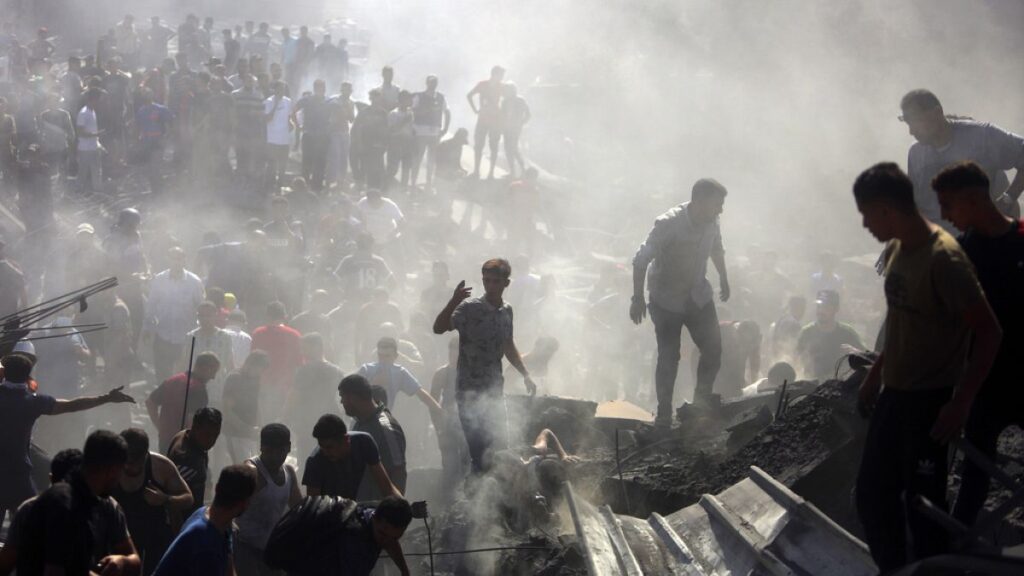Despite criticism from its American ally, Israel is increasing its airstrikes in the Gaza Strip. The United Nations warns of the catastrophic and desperate situation of Palestinian civilians. The White House national security adviser is visiting the region.
Despite calls from the European community for a ceasefire, Israel increased its bombings on the Gaza Strip this Friday. The Jewish state has warned that its war against Hamas is expected to stretch over several months, while its American ally urges it to reduce the intensity of its strikes to protect civilians.
This Friday, early in the morning, the Hamas health ministry reported “dozens of dead and wounded” in airstrikes in Khan Younes, the new epicenter of the war in the south of the Gaza Strip.
Thursday evening, the Israeli military reported “fighting” on the ground in the Chouya sector (north), where their army had suffered its biggest losses earlier this week (10 soldiers killed in one day) since the start of its ground offensive in this small, densely populated Palestinian territory.
“There will be more difficult battles in the coming days,” warned Daniel Hagari, spokesperson for the Israeli army, saying they would use “new combat methods”, such as placing explosive charges in places frequented by Hamas fighters and the choice of the “right moment” to detonate them.
In the Gaza Strip, during the night, telecommunications remained cut once again, according to the Palestinian operator Paltel, attributing this cut “to the ongoing aggression” of Israeli forces.
Hostages still in the hands of Hamas
Some 240 people were also kidnapped and taken to Gaza on the day of the attack, about 135 of whom the military says remain in the hands of Hamas and affiliated groups after the release of 105 hostages during a seven-day truce that ended on December 1.
The Israeli army announced Friday that it had recovered the remains of Franco-Israeli hostage Elya Toledano earlier this week in Gaza and had brought it back to Israel.
US officials visit Israel
American national security adviser Jake Sullivan arrived in Israel on Thursday, where he met with Prime Minister Benjamin Netanyahu and Defense Minister Yoav Gallant, at a time when Washington is concerned about the death toll in the Strip. from Gaza.
Mr. Sullivan asked “tough questions” of Israeli officials and discussed the possibility of a shift in the offensive to “lower intensity operations” in the “near future”, the White House said, without providing deadline.
“I want them (the Israelis, editor’s note) to focus on preserving the lives of civilians. Not (on) stopping against Hamas, but to be more careful,” declared Joe. Biden in Washington.
Without saying whether the Israeli army would reduce the intensity of its strikes, the Minister of Defense warned that the war against Hamas would have to drag on.
“Hamas… has established underground and aerial infrastructure that is not easy to destroy. It will take time – more than a few months – but we will win and we will destroy” Hamas, declared Mr. Gallant.
Post-war
White House national security adviser Jack Sullivan said this Friday, during a visit to Tel Aviv, that it would not be “fair” for Israel to occupy the Gaza Strip for the long term. end at the end of the war against Hamas.
“We think it doesn’t make sense for Israel, or that it would be right for Israel to occupy Gaza, reoccupy Gaza in the long term,” Jake Sullivan said Friday morning during a press briefing after meeting with Israeli officials and before a meeting with Palestinian President Mahmoud Abbas in Ramallah, in the occupied West Bank. Hamas leader Ismaïl Haniyeh, in exile in Qatar, on Wednesday described any post-war plan that imagines the Gaza Strip without his organization and other “resistance movements” as an “illusion”.
According to a poll by the Center for Palestinian Policy and Polling Research (PCPSR), an independent institute in Ramallah, 64% of Palestinians surveyed believe that Hamas will retain control of Gaza after the fighting, a scenario they say is more likely than a return of the Palestinian Authority.
In recent weeks, Israel has suggested that its aim is not to administer Gaza after the war, while commentators have questioned the possibility of the Palestinian Authority managing the territory from which it was expelled in 2007 by Hamas.
Envoy Jake Sullivan is also going to Ramallah, in the occupied West Bank, on Friday for talks with leaders of the Palestinian Authority, said a senior American official on condition of anonymity.
The Gaza Strip is a field of ruin
Gazans face desperate humanitarian conditions, seeking to flee Israeli bombings, finding themselves in ever-smaller areas.
In the far south, Rafah, a border town with Egypt, has become a gigantic makeshift camp, made of hundreds of tents cobbled together using pieces of wood, sheets and plastic tarpaulins, where the displaced are They shelter as best they can in the rain, as winter and the cold set in.
Around 1.9 million people, or 85% of the population, have been displaced, many several times since the start of the war, according to the UN, which considers humanitarian aid insufficient and believes that overcrowding in the camps leads to diseases, in addition to hunger and lack of care.
According to the Hamas Ministry of Health, nearly 18,800 people died in Israeli strikes, 70% of the victims are women, children and adolescents.

